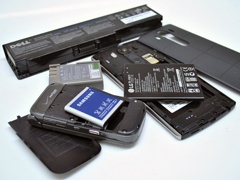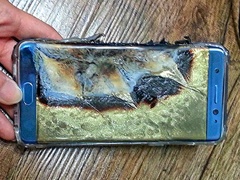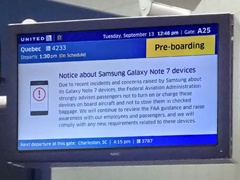 The recent safety recall of the Samsung Galaxy Note7 smartphone is causing a stir within the aviation industry. Dozens of consumers have reported these devices catch fire while charging. These incidents have been attributed to faulty lithium ion batteries. As a result, many airlines and aviation organizations have banned their use aboard airplanes.
The recent safety recall of the Samsung Galaxy Note7 smartphone is causing a stir within the aviation industry. Dozens of consumers have reported these devices catch fire while charging. These incidents have been attributed to faulty lithium ion batteries. As a result, many airlines and aviation organizations have banned their use aboard airplanes.
This restriction comes as no surprise since earlier this year, International Civil Aviation Organization (ICAO) put into effect new regulations concerning this dangerous good. The temporary aviation ban prohibits all cargo shipments of lithium ion batteries from flying on passenger aircrafts. The risk of an aircraft fire is too significant given that lithium batteries contain very high levels of energy and current in-flight suppression systems are not strong enough to put out these types of fires.
The Samsung Galaxy Note7 Ban
 Airlines all around the world including Cathay Pacific, Quantas, Emirates, and Lufthansa have now issued bans on the use and charging of faulty Samsung Galaxy Note7’s aboard their aircrafts. These devices are also prohibited from being placed in passengers’ checked baggage.
Airlines all around the world including Cathay Pacific, Quantas, Emirates, and Lufthansa have now issued bans on the use and charging of faulty Samsung Galaxy Note7’s aboard their aircrafts. These devices are also prohibited from being placed in passengers’ checked baggage.
The European Aviation Safety Agency has also issued warnings against using or charging these devices. Many others are in agreement with these warnings, so much so that “turn it off and keep it off” has been the ongoing motto for the defective Note7.
As of October 15th, 2016 the US Federal Aviation Administration (FAA), Department of Transportation (DOT), and Pipeline and Hazardous Materials Safety Administration (PHMSA) have issued an emergency ban of all Samsung Galaxy Note7 devices. This means that no one may transport these smartphones on their person, in carry-on baggage, or in checked baggage on flights to, from, or within the United States.
ICAO’s Temporary Ban
 Effective 1 April 2016, ICAO’s temporary ban on cargo shipments of lithium ion batteries designated for passenger planes will remain in effect until 2018. The primary reason for this is because a major issue exists with current packaging standards which are not strong enough to contain fires caused by lithium batteries. In addition, in-flight fire suppression systems are not powerful enough to contain or extinguish them.
Effective 1 April 2016, ICAO’s temporary ban on cargo shipments of lithium ion batteries designated for passenger planes will remain in effect until 2018. The primary reason for this is because a major issue exists with current packaging standards which are not strong enough to contain fires caused by lithium batteries. In addition, in-flight fire suppression systems are not powerful enough to contain or extinguish them.
By 2018, regulators hope new packaging designs for lithium ion batteries are safe enough to prevent extreme heat, sparks, or fires during air transport. At this time, ICAO’s regulatory ban does not apply to lithium ion batteries already installed or contained within devices, spare batteries kept in passengers’ carry-on luggage, and cargo-only airlines.
Thermal Runaway
Faulty or counterfeit lithium ion battery cells are extremely dangerous. When these batteries activate or malfunction, thermal runaway occurs. Thermal runaway is when a single battery activates in a shipment of batteries, causing a rapid chain reaction of exponentially increased temperatures and uncontrolled destruction. Lithium battery fires produce toxic, irritating fumes and may cause catastrophic explosions.
There have been several aviation incidents linked to thermal runaway. One deadly incident occurred in 2010 when a Boeing 747 crashed in Dubai killing 2 crew members. In 2011, another plane crashed off South Korea killing 2 crew members.
Conclusion
Lithium ion batteries are considered a dangerous good and hazardous material in the aviation industry. If not properly handled, they can pose a significant risk to air transport. What do you think about ICAO’s ban on shipments of lithium ion batteries designated for passenger aircrafts? Let us know what you think below.
